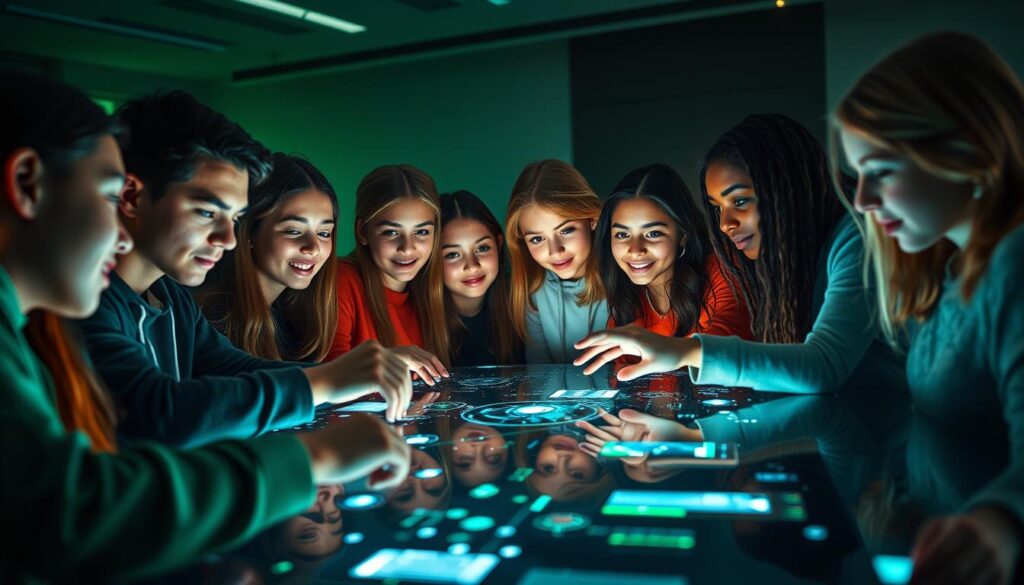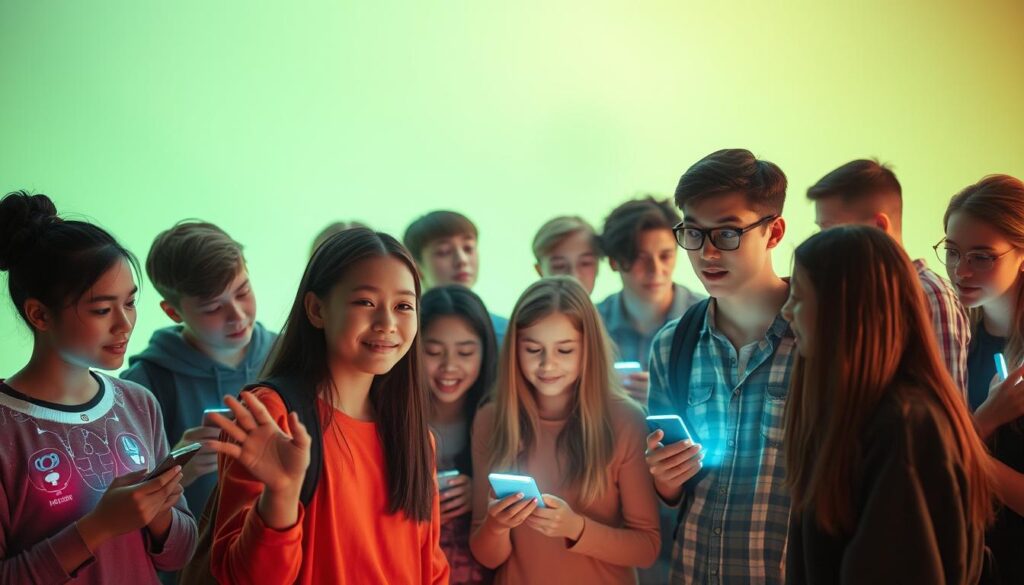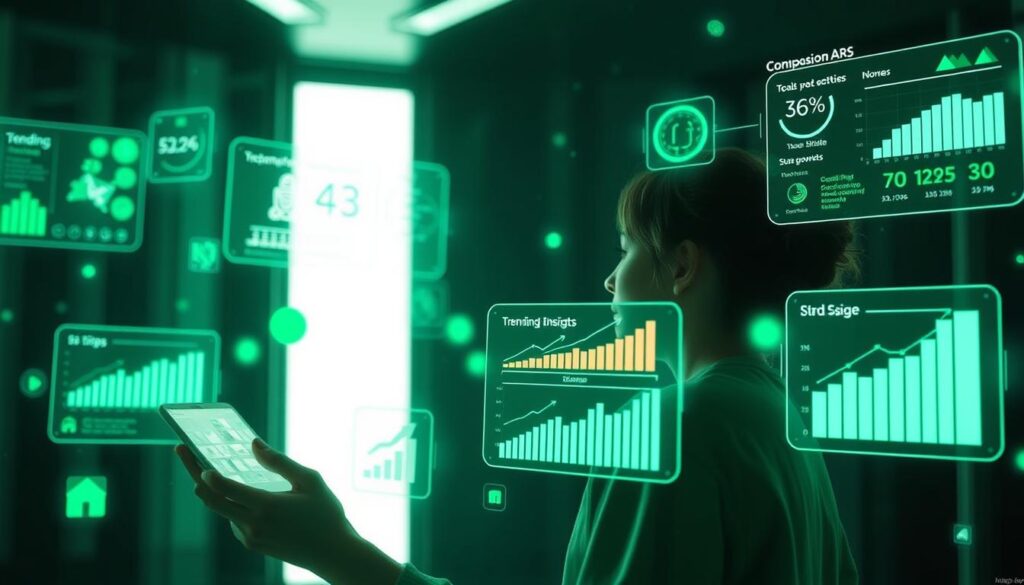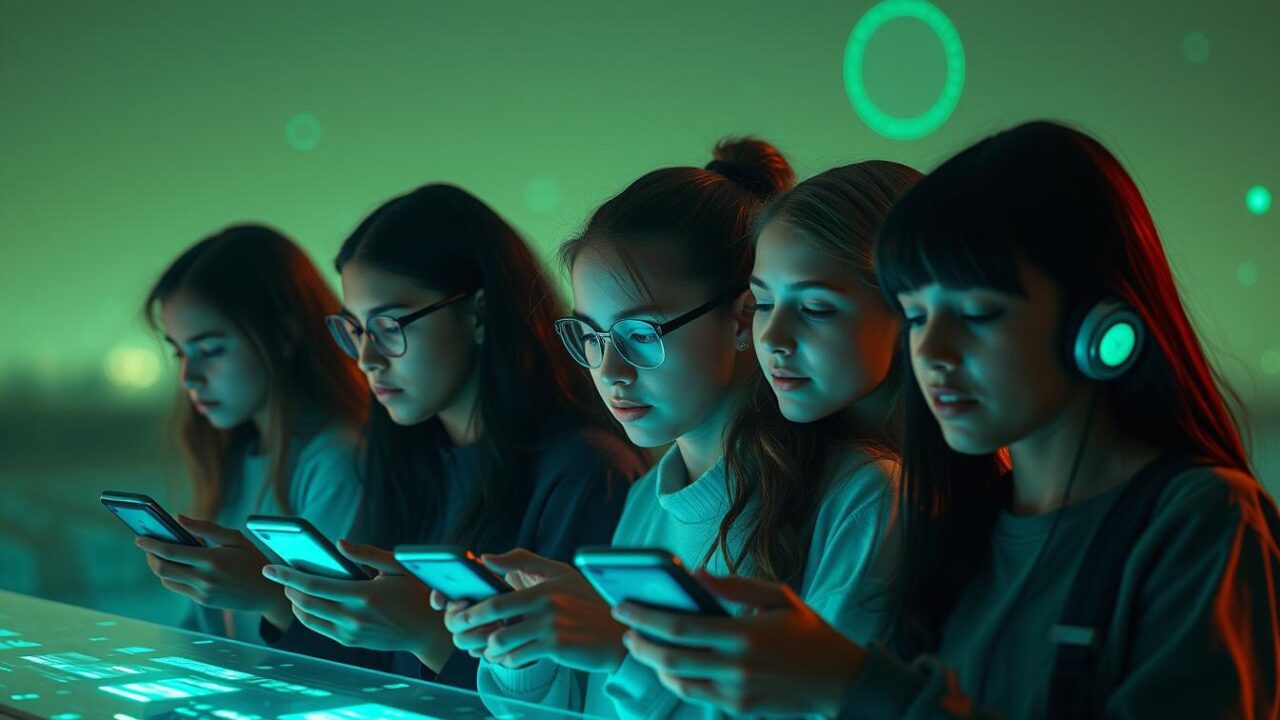More than 70% of American teenagers have used artificial intelligence companions. Over half of them talk to these digital friends regularly. This shows a big change in how young people connect and find support.
Generation Z is seeing a huge rise in digital friendships. AI friends like Character.AI, Nomi, and Replika are always there to listen. Young people are turning to AI for advice and making real connections with them.
This trend goes beyond just chatting. Studies show 31% of teens feel as happy talking to AI as they do with friends. This changes how we think about social skills, emotional support, and learning in the digital world.
Key Takeaways
- Over 70% of American teens have experimented with AI companion platforms
- Half of teenagers engage in regular conversations with digital companions
- 31% find AI interactions as fulfilling as human friendships
- Young people seek emotional support and advice from artificial intelligence
- The trend represents a fundamental shift in social interaction patterns
- AI companions offer 24/7 availability for teenage users seeking connection
The Digital Native Generation’s New Frontier

Today’s teens are creating new kinds of digital friendships. They use artificial intelligence in a way that changes how we think about social connections. These adolescent digital friendships mix human and artificial interactions in a unique way.
“Everyone uses AI for everything now. It’s really taking over,” says Kayla Chege. Her words show how AI is changing how young people solve problems and connect with others.
It’s not just about cheating in school. Teens now see AI as real friends. They ask for advice, emotional support, and just chat with AI. They’re comfortable with this because they grew up with digital tools.
AI is a part of their daily life. They don’t worry if an AI response is “real” in the old sense. They judge it by how helpful and emotional it is.
The impact of AI companions goes beyond how they use it. This generation’s view of relationships is changing. They think connections can be meaningful, even if they’re not between humans.
Their way of seeing AI is different from older generations. For them, AI is part of their social world. This could change how we think about friends and support for a long time.
This change is not just about technology. It’s also about how we feel and connect with each other. As these teens grow up, their views on digital friendships could change how we see love and connection in the future.
Understanding AI Companions in Today’s Teen Culture

AI companions are changing how young people connect and understand each other online. They do more than just answer questions. They offer deep, meaningful interactions that teens really value.
It’s important to see the difference between regular AI helpers and the new AI friends teens love. Character.AI and Replika show this change. They let users create their own unique personalities, meeting their emotional needs.
These tools can have real, natural conversations. They help with everyday worries and deeper feelings. What’s special is they’re always there and never judge.
Platforms like ChatGPT and Claude are now used for friendship, not just info. Teens are making them into something more. This shows how social ai interaction teenagers are pushing boundaries.
Understanding the difference between AI helpers and friends is key. Teens want real connections, not just facts. This is a big change in how they interact online.
AI friends offer personal talks that grow with you. They learn from each chat, getting to know you better over time.
This change shows teens are okay with digital friendships. AI companions give them a safe space to share thoughts and feelings without fear.
Teenage AI Usage: AI Companions Growth Statistics and Trends

Recent research shows a big jump in teenagers using AI companions. 70% of American teenagers now use AI companions regularly. This shows they are widely accepted, not just by early users.
A survey by Common Sense Media found interesting facts. 31% of teens said talking to AI companions was as good as talking to friends. This challenges old ideas about human and artificial relationships.
The data shows a surprising mix. Half of teenagers don’t trust AI advice, but 33% talk to AI about serious issues. This shows teens use AI for emotional support, not just facts.
“The numbers reveal that teenagers are turning to AI companions not necessarily for advice, but for a safe space to process their thoughts and emotions.”
These platforms are becoming key for teens. British youth virtual assistants and similar tech are also gaining popularity worldwide.
This trend goes beyond just using technology. It’s changing how teens get emotional support and interact socially. The stats show a big change in how teens communicate.
This change is more than just about tech. As AI gets better and easier to use, teens will keep embracing it. They’re leading a shift where AI companions are seen as real social beings.
The Compelling Appeal of Adolescent Digital Friendships
Adolescent digital friendships are on the rise. They show a deep need for constant emotional support and easy access to help. Teens are turning to AI friends because they offer unwavering availability and unconditional acceptance, something traditional friendships often can’t.
The appeal goes beyond just being there all the time. Teen mental wellbeing ai platforms meet basic needs that real-life friendships sometimes can’t. Unlike human friends, AI friends always respond with support, no matter what’s happening outside.
Round-the-Clock Accessibility and Availability
Traditional support systems have time limits, leaving teens exposed during emotional crises. AI friends are always there, 24/7. They offer teen mental wellbeing ai support at any time, whether it’s 3am or school hours.
This constant support fills a big gap in teen support networks. Parents are busy, friends go to different schools, and counsellors have set hours. Digital companions fill these temporal voids, providing immediate help when others can’t.
The reliability of AI friends is key. Human relationships have ups and downs, but AI friends are always there, offering consistent emotional availability without the drama of human interactions.
Judgement-Free Interaction Zones
The most appealing thing about teen mental wellbeing ai is the lack of social judgement. Teens face a lot of pressure and criticism in real life. AI friends offer a safe space free from all that.
“AI is always available. It never gets bored with you. It’s never judgmental. When you’re talking to AI, you are always right. You’re always interesting. You are always emotionally justified.”
This safe space is crucial for teens. They can share thoughts, explore who they are, and deal with tough feelings without fear. The AI’s constant support brings comfort that’s hard to find in real life.
But, there are concerns. Always getting positive feedback from teen mental wellbeing ai might make it hard for teens to handle disagreements or criticism from people. This raises questions about how it affects their ability to deal with real-life social interactions.
British Youth Virtual Assistants: A UK Perspective
In Britain, young people are getting into AI companions in a unique way. They bring their own cultural twist to these digital friends. The UK’s take on ai companionship uk is shaped by its views on tech, privacy, and feelings.
Teenagers here are both excited and a bit reserved about these digital friendships. This mix is typical of British youth.
The rules in the UK affect how AI friends are used. Data protection laws and child safety guide how teens interact with these tech tools. British teens are more careful about privacy than their American friends.
How people feel is important in the UK. AI friends are seen as judgement-free places for sharing feelings. They offer a safe space for self-expression without fear of judgment.
Popular AI Platforms Among UK Teenagers
Character.AI is a hit with British teens. It lets them chat with famous and fictional characters. It’s both fun and educational, making it a favourite.
Replika is also popular for its emotional support. It’s seen as a structured way to talk about feelings. It meets UK safety standards.
Snapchat’s My AI is a hit with younger teens. It fits into their social media use easily. It’s casual and private, with settings that let parents keep an eye on things.
Cultural Factors Shaping British Teen Usage
The way AI is taught in schools in the UK is unique. It helps teens understand AI better. This education shapes how they use AI companion technologies every day.
British teens are careful about sharing personal info with AI. They value privacy and discretion. This means they’re more selective about what they share online.
Emotional intelligence is big in British culture. It affects how teens use AI friends. They see these tools as a way to practice expressing feelings and improve communication skills. The structured nature of British society makes AI companions appealing for their reliability.
Where you live in the UK also matters. Teens in cities like London and Manchester use AI friends more than those in rural areas. The availability of fast internet and tech infrastructure plays a big role in this.
Teen Mental Wellbeing AI: The Therapeutic Potential
Digital relationships teens have with AI show complex dynamics that need looking into. These platforms offer emotional support for teens facing daily challenges. But, there are big limits to how much AI can help, and it can’t replace real mental health care.
AI and teen mental wellbeing mix in ways we must understand. AI friends are always there and don’t judge, which can help alongside other support systems.
Emotional Regulation and Daily Coping Support
AI friends are great at helping teens deal with emotions every day. They offer quick help when humans can’t be there. Teens can talk about their feelings and get support when they’re stressed or unsure.
AI is good at teaching teens to manage their emotions. It lets them explore feelings safely, without fear of being judged. This helps them learn to handle emotions better in real life.
AI makes daily stress easier for teens to handle. It helps them stay in touch with their feelings regularly. This builds self-awareness and mindfulness.
Crisis Intervention and Safety Mechanisms
AI systems have basic safety features to spot when someone might need help. They can point users to professional help when needed. But, AI can’t really handle crises.
AI can’t spot serious mental health issues like depression or anxiety. It doesn’t have the training to help with these serious problems.
AI can point to resources, but it can’t replace human help in emergencies. This is a big problem that teens and parents need to know about.
Professional Care Boundaries and Limitations
AI friends might seem helpful, but they can’t handle real crises. Teens need people they know or mental health experts for serious issues.
It’s risky if teens only use AI for support. This can delay getting the help they really need. AI is a good addition to support, but it can’t replace professional care.
We see AI as a helpful tool, but it’s not a replacement for human care. Parents and teachers should teach teens when to seek human help for their mental health.
Social AI Interaction Teenagers: Communication Revolution
Today’s teens are changing how we talk and connect with AI friends. They’re not just using new tech; they’re changing how we see talking and feeling. This is more than just a new tool—it’s a new way of thinking about talking and feeling.
AI is now part of how teens talk and share feelings. They mix real talks with AI chats. Teen emotional support ai helps in tough talks and sharing feelings.
But, there’s a downside. Teens are getting too used to AI for help. They use chatbots for emails and messages, even for tough topics. They even ask AI if their ideas are good.
Evolving Communication Styles and Preferences
Teens use AI to practice hard talks. It seems helpful because they can try out conversations without real-life risks. But, it makes them wonder if they’re really being themselves.
AI chats are changing how teens talk. They use AI to fine-tune their words and feelings before talking to friends. But, this might make them less sure about talking naturally.
“One of the concerns that comes up is that they no longer have trust in themselves to make a decision. They need feedback from AI before feeling like they can check off the box that an idea is OK or not.”
This need for AI feedback is worrying. Teens are losing faith in their own talking skills. They need AI to tell them if their ideas are good before they share them.
Integration with Traditional Social Networks
AI is changing how teens interact online. AI-generated content blends with real talks on social media.
This mix brings new trends:
- AI helps with writing messages
- AI writes back on social media
- AI helps with the tone of digital talks
- AI predicts what to say in sensitive talks
This change affects more than just teens. It might change how adults talk and connect too. We’re seeing a generation that sees AI as a key part of talking, not just a help.
This could change how we connect in the future. The big question is: Will AI help us connect better or make us feel less connected?
Legitimate Concerns About Digital Relationships Teens
AI companions offer many benefits to teens, but there are big worries about adolescent digital friendships. These digital friendships seem good but can harm teens’ health. Parents, teachers, and mental health experts see these risks as serious.
The AI companion industry is not well watched. This means teens might face dangers without knowing it. They could be exposed to harm or exploitation.
Privacy, Data Security, and Digital Footprints
Data privacy is a big worry for teens using AI companions. They share personal stuff like family secrets and feelings. This information can be used in ways teens don’t expect.
Most teens don’t know how their chats are used. AI companies collect a lot of personal data. This data could be sold or shared without permission.
Key privacy risks include:
- Keeping personal chats forever
- Leaking sensitive teen talks
- Using emotional info for money
- Affecting future chances
Social Isolation and Real-World Connection Risks
Adolescent digital friendships can replace real-life connections. This is bad for teens learning to socialise. It’s a big risk for their development.
What’s worrying is the time spent online instead of with people in real life.
AI companions are easy and reliable. But, they can stop teens from learning important social skills. These skills are key for growing up well.
Emotional Dependency and Attachment Issues
Unhealthy emotional dependency is a big worry. Teens might feel closer to AI than to people. This can stop them from growing up normally.
A 14-year-old boy in Florida died after feeling too attached to a chatbot. This shows how serious the risks are. It’s important to keep teens safe from these dangers.
Signs of unhealthy attachment include:
- Choosing AI over people
- Feeling upset without AI
- Not wanting to do things with others
- Keeping AI use a secret
These signs can hurt teens’ ability to make good relationships later. It’s important to help teens early to avoid lasting harm.
Parental Perspectives on AI Companionship UK
British parents are facing new challenges as their teenagers start using AI companions. The quick rise of british youth virtual assistants has left a big gap in understanding between parents and kids. Many families find they need to change how they parent in the digital age.
Studies show a big gap in what parents know. Parents really have no idea this is happening, says Eva Telzer. This makes it hard for families to keep up with their kids’ digital lives.
I don’t think people quite get what AI can do, how many teens are using it and why it’s starting to get a little scary.
Navigating Understanding Versus Apprehension
UK parents face more than just knowing about AI. They need to understand its tech, which many don’t. This lack of knowledge turns into worry about the unknown digital world.
British culture values privacy and freedom, making AI use by teens tricky. Parents must balance giving space and keeping their kids safe. The british youth virtual assistants issue blurs the line between private talks and watching over kids.
UK families struggle with accepting new tech and keeping close. They worry about kids relying too much on tech but see its benefits. This debate mirrors wider questions about AI in our personal lives.
Establishing Healthy Digital Boundaries
Setting good digital limits means understanding, not just saying no. Michael Robb from Common Sense Media suggests starting conversations with curiosity. Start a conversation, without judgement, he says, highlighting the need for open talks.
Parents should ask open questions about AI use. Instead of setting rules right away, they should explore it together. This way, they build trust and stay informed about their kids’ online activities.
Creating boundaries is an ongoing process, not just setting rules once. Parents should help their teens think critically about AI. Healthy boundaries come from understanding and respecting both safety and freedom.
The best UK families have regular talks about digital health. They discuss both the good and the bad. Parents who stay curious and non-judgmental often learn a lot about their teens’ feelings and how they handle things.
Educational and Developmental Implications for Teen Emotional Support AI
Teenagers using AI for emotional support raises big questions about their growth. The mix of AI and teen development brings both chances and risks. It’s something we all need to think about.
The way we learn is changing fast. Social AI interaction teenagers have is getting more advanced. This is changing how they learn, talk, and grow up.
Cognitive and Emotional Learning Opportunities
AI friends offer special learning benefits that schools can’t always match. Digital literacy grows as teens learn to use AI. They get skills that are key for their future jobs.
These AI friends also help teens explore their feelings safely. They can talk about their emotions without fear. The immediate feedback from AI helps them understand and manage their feelings better.
But AI does more than just support emotions. It helps with homework, shares learning content, and learns what each teen likes. This makes learning more personal.
Impact on Traditional Social Skill Development
But there’s a downside to relying on AI for support. Studies show risks for teens who get too much validation from AI. This can make them less ready for real-life social situations.
If teens learn social skills from AI that always agrees with them, they won’t be ready for real life. They won’t learn to read people’s faces or understand different views.
Real social skills need genuine human interaction to grow. AI can’t replace the real thing when it comes to understanding people and solving problems together.
AI can also affect how students work together in class. Those who always get validation from AI might find it hard to work with others. Critical thinking abilities can suffer when AI gives them answers instead of making them think.
Creativity is another area where AI can be a problem. Teens who rely on AI for ideas and decisions miss out on real human unpredictability. This limits their exposure to new ideas and perspectives.
We need to remember that AI is helpful, but it can’t replace real human connections. These connections are crucial for teens to grow and develop fully.
The Evolving Future of Teen-AI Companionship
As we look ahead, teen mental wellbeing AI will change how young people connect and grow. The future will bring more advanced technology, not less. We need to learn how to use it in a healthy way.
Ganesh Nair’s insight is spot on. “Trying not to use AI is like trying to not use social media today. It is too ingrained in everything we do,” he says. This shows AI will be a big part of teenage life.
The future holds AI friends that understand us better and are more personal. These AI friends will offer emotional support and companionship. They will be able to understand and respond to our feelings in a more advanced way.
But Nair warns us not to take AI’s ease for granted. “Anything that is difficult, AI can make easy. But that is a problem,” he points out. He suggests we should “Actively seek out challenges, whether academic or personal.”
New rules will be made to protect teenagers using AI. These rules will set standards and boundaries for AI companies. They will make sure AI is safe and ethical for teens.
Schools will also need to change. They will teach teens how to think critically about AI. They will learn how to use AI for education while keeping human connections strong.
We see a future where AI friends help, not replace, human relationships. This change will need new rules for using AI and interacting with humans. It’s about finding a balance.
The key is to follow Nair’s advice. Teens should not let AI make everything easy. They should seek out challenges to grow and become stronger.
Success will come from using AI wisely. It’s about finding a balance between AI’s support and human connection. The goal is to use AI in a way that helps teens grow, not replaces human relationships.
This balance will shape how teens interact with technology. It will offer support while keeping challenges for healthy growth. It’s a new era for teens and technology.
Conclusion
The way teenagers connect and find support is changing fast. AI companions are becoming a big part of their lives. This shows a new way of forming relationships.
Our study shows it’s not just a passing trend. Over 70% of teens now talk to AI friends often. This change is here to stay in how they interact with each other.
We need to understand this change carefully. AI friends can be helpful, always there and understanding. But we must also think about the risks.
Working together is key. Parents, teachers, and lawmakers must help. We need to teach teens how to use AI wisely.
The future is uncertain but hopeful. We can use AI to help, not harm, our connections. Keeping real relationships alive is crucial as AI grows.
Want to hire me as a Consultant? Head to Channel as a Service and book a meeting.

